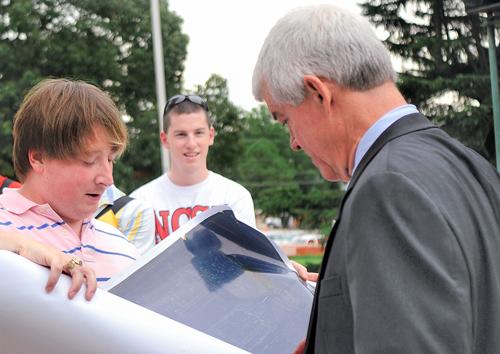
©2009 NCSU Student Media
Photo by Luis Zapata
Matt Robbins, a graduate student in architecture, will give a presentation on the history of the University as well as talk about his interest in completing the Bell Tower project Tuesday. The presentation, the first in series of talks by invited students, will take place at 4 p.m. in D.H. Hill Library’s assembly room.
Robbins’ interest in the school’s history began early during his undergraduate career.
“A lot of this started when I was an undergrad,” he said. “I got interested in the narrated story a building could physically tell.”
Now wrapping up his final semester of graduate school on campus, he continues to add to his knowledge of campus.
“The special collections library in the University archives is a giant repository of information,” he said. “A lot of the stuff in the archives is still waiting to be looked at and accessed for the very first time.”
According to Robbins, digging up history has become much more than a hobby.
“It’s that ‘National Treasure’ feeling you get when you attach your thought process to someone else’s thought processes a hundred years later. It gets personal,” he said. “That’s what happened to me with this Bell Tower project. I want to put into action what they were thinking.”
Robbins thinks it is important that other students understand these stories.
“The biggest reason why I want to tell people is so that people will spread the tradition,” he said. “[The University] is more than a haphazard collection of bricks.”
According to Robbins, his presentation will canvass everything from, the founding of the college, to integration of sexes and how the college grew from a group of freemasons into a globally recognized University.
Robbins said understanding the intentions of the University’s founders as well as the school’s history can mean a lot to students. In particular, he wants students to understand the vision of Leonidas Polk, who championed the goals of the Wautaga Club to create a physical University intent on practical education.
“Looking back at this history allows us to look back and see how we grew up in that mentality,” he said. “Campus is a place where people get a practical education, and use it in their community for the better good, and bring it back to campus to do good here. Ownership is very important.”
He hopes his talk will give curious students access to that history.
“I want this to be a discussion, where people can understand and engage,” he said. “I want it to be people who walk around campus, see stuff, and want to know about it. Then they can know more about the environment to which they devote four years of their life.”